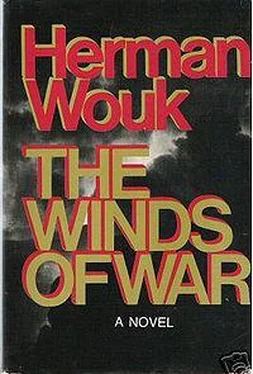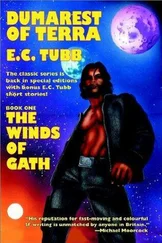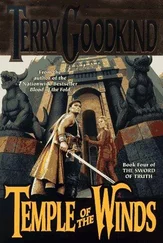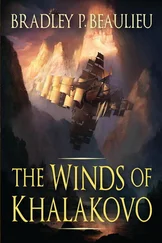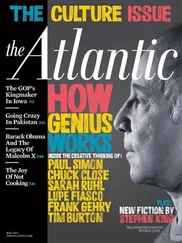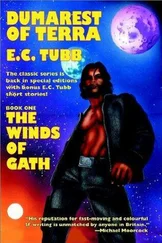Herman Wouk - The Winds of War
Здесь есть возможность читать онлайн «Herman Wouk - The Winds of War» весь текст электронной книги совершенно бесплатно (целиком полную версию без сокращений). В некоторых случаях можно слушать аудио, скачать через торрент в формате fb2 и присутствует краткое содержание. Год выпуска: 1971, Издательство: Collins, Жанр: Историческая проза, на английском языке. Описание произведения, (предисловие) а так же отзывы посетителей доступны на портале библиотеки ЛибКат.
- Название:The Winds of War
- Автор:
- Издательство:Collins
- Жанр:
- Год:1971
- ISBN:нет данных
- Рейтинг книги:4 / 5. Голосов: 1
-
Избранное:Добавить в избранное
- Отзывы:
-
Ваша оценка:
- 80
- 1
- 2
- 3
- 4
- 5
The Winds of War: краткое содержание, описание и аннотация
Предлагаем к чтению аннотацию, описание, краткое содержание или предисловие (зависит от того, что написал сам автор книги «The Winds of War»). Если вы не нашли необходимую информацию о книге — напишите в комментариях, мы постараемся отыскать её.
About the Author
Herman Wouk's acclaimed novels include the Pulitzer-Prize winning
;
;
;
;
;
; and
.
The Winds of War — читать онлайн бесплатно полную книгу (весь текст) целиком
Ниже представлен текст книги, разбитый по страницам. Система сохранения места последней прочитанной страницы, позволяет с удобством читать онлайн бесплатно книгу «The Winds of War», без необходимости каждый раз заново искать на чём Вы остановились. Поставьте закладку, и сможете в любой момент перейти на страницу, на которой закончили чтение.
Интервал:
Закладка:
It was a spare lunch: nothing but vegetables with white rice, then cheese and fruit. The service was on fine old china, maroon and gold. A small, gray-headed Italian woman passed the food. The tall dining room windows stood open to the garden, the view of Siena, and a flood of pale sunshine. Gusts of cool air came in as they ate.
When they first sat, the girl said, “What have you got against the Italian Renaissance, Byron?”
“That’s a long story.”
“Tell us,” said Jastrow in a classroom voice, laying a thumb across his smiling mouth.
Byron hesitated. Jastrow and the Rhodes Scholar made him uneasy. The girl disconcerted him more. Removing her glasses, she had disclosed big slanted dark eyes, gleaming with bold intelligence. She had a soft large mouth, painted a bit too orange, in a bony face. Natalie was regarding him with a satiric look, as though she had already concluded that he was a fool; and Byron was not fool enough to miss that.
“Maybe I’ve had too much of it,” he said. “I started out fascinated. I’m ending up snowed under and bored. I realize much of the art is brilliant, but there’s a lot of overrated garbage amid the works of genius. My main objection is that I can’t take the mixture of paganism and Christianity. I don’t believe David looked like Apollo, or Moses like Jupiter, or Mary like every Renaissance artist’s mistress with a borrowed baby on her lap. Maybe they couldn’t help showing Bible Jews as local Italians or pseudo-Greeks, but—” Byron dried up for a moment, seeing his listeners’ amused looks. “Look, I’m not saying any of this is important criticism. I guess it just shows I got into the wrong field. But what has any of it to do with Christianity? That’s what sticks in my craw. Supposing Christ came back to earth and visited the Uffizi, or Saint Peter’s? The Christ of your book, Dr. Jastrow, the poor idealistic Jewish preacher from the back hills? That’s the Lord I grew up with. My father’s a religious man; we had to read a chapter of the Bible every morning at home. Why, Christ wouldn’t even suspect the stuff related to himself and his teachings.” Natalie Jastrow was regarding him with an almost motherly smile. He said brusquely to her, “Okay. You asked me what I had against the Italian Renaissance. I’ve told you.”
“Well, it’s a point of view,” she said.
Eyes twinkling behind his glasses, Slote lit his pipe, and said between puffs, “Don’t fold up, Byron, there are others who have taken your position. A good name for it is Protestantism.”
“Byron’s main point is accurate.” Dr. Jastrow sounded kindly, dancing his little fingers together. “The Italian Renaissance was a great blossoming of art and ideas, Byron, that occurred when paganism and the Hebrew spirit — in its Christian expression — briefly fertilized instead of fighting each other. It was a hybrid growth, true, but some hybrids are stronger than either parent, you know. Witness the mule.”
“Yes, sir,” said Byron, “and mules are sterile.”
Amused surprise flashed on Natalie Jastrow’s face, and her enormous dark eyes flickered to Leslie Slote, and back to Byron.
“Well said. Just so.” Jastrow nodded in a pleased way. “The Renaissance indeed couldn’t reproduce itself, and it died off, while the pagan and Hebrew spirits went their separate immortal ways. But that mule’s bones are now one of mankind’s richest deposits of cultural achievement, Byron, whatever your momentary disgust from overexposure.”
Byron shrugged. Leslie Slote said, “Is your father a clergyman?”
“His father’s a naval officer,” said Jastrow.
“Really? What branch?”
Byron said, “Well, right now he’s in War Plans.”
“My goodness! War Plans?” Dr. Jastrow pretended a comic flutter. “I didn’t know that. Is it as ominous as it sounds?”
“Sir, every country draws up theoretical war plans in peacetime.”
“Does your father think a war is imminent?”
“I got my last letter from him in November. He said nothing about a war.”
The other three exchanged odd glances. Slote said, “Would he, in casual correspondence?”
“He might have asked me to come home. He didn’t.”
“Interesting,” said Dr. Jastrow, with a little complacent grin at Slote, rubbing his tiny hands.
“As a matter of fact, I think there’s going to be a war,” Byron said. This caused a silence of a second or two, and more glances.
Jastrow said, “Really? Why?”
“Well, I just toured Germany. You see nothing but uniforms, parades, drills, brass bands. Anywhere you drive, you end up passing army trucks full of troops, and railroad cars loaded with artillery and tanks. Trains sometimes a couple of miles long.”
“But, Byron, it was with just such displays that Hitler won Austria and the Sudetenland,” said Jastrow, “and he never fired a shot.”
Natalie said to Byron, “Leslie thinks my uncle should go home. We’ve had a running argument for three days.”
“I see.”
Jastrow was peeling a pear with elderly deliberate gestures, using an ivory-handled knife. “Yes, Byron, I’m being mulish.” The use of the word was accidental, for he grinned and added, “Being a hybrid of sorts myself, I guess. This is a comfortable house, it’s the only home I have now, and my work is going well. Moving would cost me half a year. If I tried to sell the house, I couldn’t find an Italian to offer me five cents on the dollar. They’ve been dealing for many centuries with foreigners who’ve had to cut and run. They’d skin me alive. I was aware of all this when I bought the villa. I expect to end my days here.”
“Not this fall at the hands of the Nazis, I trust,” Slote said.
“Oh, hell, Slote,” Natalie broke in, slicing a flat hand downward through the air. “Since when does the Foreign Service have such a distinguished record for foresight? Since Munich? Since Austria? Since the Rhineland? Weren’t you surprised every time?”
Byron listened with interest to this exchange. The others seemed to have forgotten he was at the table.
“Hitler has been making irrational moves with catastrophic possibilities,” Slote retorted. “Anybody can pull a gun in the street and shoot four people down before the cops come and stop him. Until now that’s been Hitler’s so-called foreign policy brilliance in a nutshell. The surprise of an outlaw running wild. That game’s played out. The others are aroused now. They’ll stop him in Poland.”
Jastrow ate a piece of pear, and began to talk in a rhythmic mellifluous way, something between meditating aloud and lecturing in a classroom. “Leslie, if Hitler were the Kaiser, or a man like the Charles the Twelfth, I admit I’d be worried. But he’s far more competent than you think. Fortunately the old ruling class is destroyed. They unleashed the World War with their dry-rotted incompetence, those preening, posturing, sleek royalties and politicians of 1914, those bemedalled womanizers and sodomites out of Proust. They never dreamed that the old manners, the old paperwork, the old protocol, were done for, and that industrialized warfare would shatter the old system like a boot kicked through a dollhouse. So they went to the trash heap, and new leadership came up out of the sewers, where realism runs and change often starts. The early Christians haunted the sewers and catacombs of Rome, you know,” Jastrow said to Byron Henry, clearly relishing a fresh audience.
“Yes, sir, I learned about that.”
“Of course you did. Well, Hitler’s a vagabond, Mussolini’s a vagabond, and Stalin’s a jailbird. These are new, tough, able, and clever men, straight up from the sewers. Lenin, another jailbird, was the great originator. He made it all up, Leslie, you realize — the Jesuitical secret party, the coarse slogans for the masses and the contempt for their intelligence and memory, the fanatic language, the strident dogmas, the Moslem religiosity in politics, the crude pageantry, the total cynicism of tactics, it’s all Leninism. Hitler is a Leninist, Mussolini is a Leninist. The talk of anti-communism and pro-communism is for fools and children.”
Читать дальшеИнтервал:
Закладка:
Похожие книги на «The Winds of War»
Представляем Вашему вниманию похожие книги на «The Winds of War» списком для выбора. Мы отобрали схожую по названию и смыслу литературу в надежде предоставить читателям больше вариантов отыскать новые, интересные, ещё непрочитанные произведения.
Обсуждение, отзывы о книге «The Winds of War» и просто собственные мнения читателей. Оставьте ваши комментарии, напишите, что Вы думаете о произведении, его смысле или главных героях. Укажите что конкретно понравилось, а что нет, и почему Вы так считаете.
